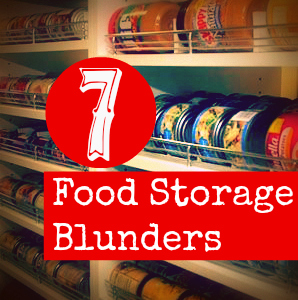 Q: What’s better than a survival food cache?
Q: What’s better than a survival food cache?
A: A survival food cache that you can actually use in a crisis…
You might think I’m being disingenuous, but I’m really not. Creating a survival food cache takes a lot more effort than just piling up some canned goods in the hall closet. And believing you have a comprehensive food cache when you really don’t can be more dangerous than not having one at all.
Not only should you spend some time thinking about nutritional needs and how your store foods can be used to make actual meals… there are countless other considerations that can make or break your food stockpile.
1. No can opener – Most survival food stockpiles contain a high volume of canned goods. But a surprising number of people think to include a manual can opener of some kind in their survival storage. Most people think, “I have one in the kitchen, why do I need one that stays with my cache?”
There are a million different answers to that question, all of which will become apparent when you’re breaking your canned foods open with a hacksaw and pulling tiny metal filings out of your green beans.
2. It’s all in the basement – Heaven forbid that your home should be flooded. But if it is, your food supply is toast, er… soggy toast. Take time when considering where to store you food cache. Keeping it high and dry is a good idea. So is spreading your cache out across multiple locations within your home.
3. Don’t forget cooking water – Preparing food can take a substantial amount of water, not to mention washing dishes. If you only store enough water to drink, then how will you rehydrate those expensive survival meals? How will you cook pasta or prepare your powdered eggs? There really is no such thing as “too much” potable water.
4. Storing foods you’re not used to eating – The term comfort food goes beyond simply taste. In an emergency, you want to eat foods that your body is comfortable digesting. Sudden switches to a foreign diet (MREs for example) can lead to all kinds of discomfort, bloating, and/or diarrhea. It’s important to acclimate yourself to the foods you’re storing, or store only foods your already familiar with.
5. Expired stockpile – Even canned goods have an expiration date. It’s important to rotate items in and out of your food cache before they expire. Label all bulk containers clearly with dates and contents. Otherwise, you’ll have a survival cache of items that aren’t fit to eat.
6. Foods you don’t know how to prepare – Few of us prepare powdered eggs on a daily, weekly, or monthly basis. So it stands to reason that you may forget the ratio of water to egg powder. Write out all instructions, tips, etc. on the containers of food that may be troublesome to prepare. If you don’t know how to prepare cornbread from scratch, store the “just add water” kind.
7. You forgot alternative tools – When the power goes out, or gas service is suspended, how will you boil water? Camp stoves, propane grills (and propane), as well as many other off-the-grid implements may be necessary to prepare the items in your stockpile. If you don’t have the needed cookware/utensils/fuel, then much of your food cache may be useless to you.
SHARE YOUR OWN FOOD STORAGE TIPS BELOW!!

